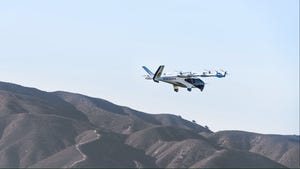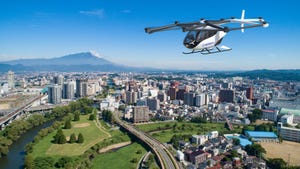Air Taxi Company Gets Another $70M from BoeingAir Taxi Company Gets Another $70M from Boeing
The Wisk investment is aimed at its Montreal engineering center, which is developing a self-flying taxi

Boeing is investing $70 million in its flying taxi subsidiary Wisk Aero as part of a larger investment to further its innovation efforts in Canada.
The Wisk investment is aimed at its Montreal engineering center, which is developing a self-flying, four-passenger eVTOL (electric vertical takeoff and landing) air taxi.
The overall investment of $176 million includes advanced landing gear research and the Aerospace Development Center in the New Quebec Espace Aero Innovation Zone.
“Boeing’s continued support of our Montreal engineering hub is a testament to the important work we’re already doing here in Canada,” said Sebastien Vigneron, Wisk senior vice president of engineering and programs. “This is a tremendous opportunity to expand our team, tap further into the exceptional aerospace talent in Québec and bring us one step closer to making our mission of bringing safe, everyday flight to everyone a reality.”
Wisk Aero is also bringing its self-flying electric aerial vehicles (EAV) to Greater Houston, Texas, as part of a recent partnership agreement.
Wisk and the city of Sugar Land agreed to work together to identify a location at the Sugar Land Regional Airport for the development of vertiport infrastructure for Wisk’s autonomous air taxi operations.
This partnership aims to lay the foundation to establish a larger network across the Greater Houston region.
As part of the deal, Wisk will provide advice on technical needs for EAV operations, including infrastructure, training, ground operational procedures and plans for potential site expansion.
Sugar Land intends to focus on integrating advanced air mobility (AAM) into its plans and establish operational policies.
The Wisk Aero vertical takeoff and landing vehicle, which seats four people, has a fixed wingspan of 50 feet and cruises up to 4,000 feet above ground at speeds up to 135 mph.
The plane is self-flying “with human oversight,” according to the company.
Boeing last year invested $450 million in Wisk and later acquired the startup, making it a Boeing subsidiary.
Boeing, Archer Aviation and Wisk have agreed to collaborate on autonomous flight.
Wisk last year conducted a demonstration flight of its EAV at the airport in Oshkosh, Wisconsin, including hovering and wing-borne flight multiple times and included 360-degree turns in place.
Wisk, one of the highest-funded EAV companies, has a partnership with Japan Airlines to provide flying taxis to Japan.
The infrastructure for flying vehicles is being developed globally. For example, Beta Technologies is installing EAV charging stations at airports, including Eglin Air Force Base in Florida and the Raleigh Executive Jetport in North Carolina.
Vertiports to provide for the takeoff, landing and servicing of EAVs are being developed by companies such as Volatus Infrastructure, also located at the airport in Oshkosh.
And showrooms for the general public to see and purchase flying vehicles are being developed by Aeroauto Global with showrooms in Florida and another in development in Austin, Texas.
Like what you've read? For more stories like this on flying cars and other emerging technologies, sign up for our free daily email newsletter to stay updated!
Read more about:
Flying CarsAbout the Author
You May Also Like








